- Home
- Terry Goodkind
Nest Page 3
Nest Read online
Page 3
“Is there still … blood? Has the blood been cleaned up?”
The woman detective, surveying the darkness and the spectators, turned away and stepped closer to Kate to explain.
“I’m afraid that we have to leave everything as is until the investigation is complete. We can recommend a couple of companies that are licensed and bonded to clean up crime scenes. When the investigation is finished in a few days they can come in and take care of everything for you. They have the proper experience. It’s better to let them handle it.
“We’d just like you to take a quick look around, now, if you feel up to it.”
The woman put out a hand to steady Kate when she stood, but Kate didn’t need the hand.
“I’m Detective Janek, by the way,” the woman said as she shook Kate’s hand. “I’ll go with you if you’re willing to go inside and maybe help us answer a few questions.”
If she was willing? For hours, Kate had been asking them to let her go in. Instead of reminding them of that fact, she forced a brief smile.
“I’m fine. Really. It’s just such a shock. I can’t believe that someone would want to hurt John. He was like a kid—you know, innocently happy most of the time. I just can’t believe that anyone would want to hurt him.” She thought again about her mother’s half brother, Everett. “Was John killed in a robbery? Was someone robbing the house and they killed John?”
The detectives shared a look.
Detective Janek leaned in a little. “Listen, Miss Bishop—”
“Please, call me Kate?”
“Miss Bishop” was what people working for KDEX Systems always called her when she showed up unexpectedly from the home office.
Detective Janek smiled. Kate thought it looked genuine. “Kate, we need to tell you about a few things before you hear them in the press. And then after we go inside we’d like you to identify your brother while the coroner’s van is still here. It will save you from having to go down to the morgue. But we want you to be prepared, first.”
Prepared? Kate swallowed. “All right.”
Detective Janek glanced around to check if anyone was close, then looked back to search Kate’s eyes. “Whoever did this was pretty sick.”
“What do you mean?”
“He … removed your brother’s eyes.”
“Removed his eyes?” Kate blinked. “Why?”
“We haven’t determined that. One of them was missing. The other was lying beside the body. It appears to have been partially eaten.”
Kate’s brain seemed to go blank.
She usually had command of matters that needed figuring out. She usually knew just what to ask to get to the bottom of things.
But now she couldn’t seem to make her mind work. She felt numb with anger at someone hurting John and doing such a thing to him. She knew John’s fears well. She tried not to imagine his cries of terror and pain. She felt a hot wave of guilt for not being there to protect him.
“Who could do such a thing?”
“That’s what we’re going to try to find out,” Detective Sanders said.
“Take me in there,” Kate said, her anger rising. “Show me what you need me to explain.”
Detectives Sanders and Janek shared a look at her determined tone, at the simmering rage it carried.
When they started for the house, Kate followed close on Detective Sanders’s heels. Detective Janek stayed protectively at her side. When they reached the steps, they put on blue paper booties and asked Kate to do the same.
On the porch outside, a numbered yellow tag stood beside what looked like a bloody footprint. As she stepped into the living room, where there was more light, she saw a smear of blood at about eye level on the inside of the oak door.
The blood in the living room didn’t look the way Kate had imagined it. She thought it would be mostly soaked into the wood floor or dried up. Instead, not far inside the door, there was a horrific, vast pool of it that they had to skirt.
Kate was shocked to see blood splattered everywhere in the living room. Besides what was on the floor, the violence of the attack had left strings and splatters of blood on the walls, the couch, the lampshades, even the drapes.
Some dim, analytical part of her brain said, So this is what a murder scene looks like.
Kate saw smeared, bloody footprints in a twisting path. At the far edge of the pool of blood was a crooked smear that looked like it might have been where her brother’s arm lay sprawled across the floor. There seemed little doubt that John had tried desperately to get away. He had not gone down easily. He had struggled for his life.
“Why is that up here?” Kate asked, pointing.
A rusty, four-tined garden fork lay on the floor near the pool of blood. A yellow plastic tag with the black number “6” stood beside it. She was beginning to see why they had questions.
“My father used that fork to till a small garden in the backyard,” she said. “In the fall he dug potatoes with it.”
Kate frowned as she leaned down a little for a better look. “The tines have been sharpened. My father just turned dirt over with it. It was rusty and it wasn’t sharp. The tips look like they’ve been filed.”
Before they could answer, Kate pointed to four splintered holes in the pine floor, amid a broad area of blood. “It looks like someone stuck it in the floor, right there.”
Detective Sanders nodded. “I’m afraid that the killer used it to pin the deceased’s feet to the floor, probably to prevent him from escaping.”
Kate’s jaw hung in stunned surprise. “Why not just hit him over the head?”
“We don’t know the answer to that,” Detective Janek said. “Sometimes it’s simply an act of blind rage, sometimes they have a reason. When I find him, I’ll ask.”
By the woman’s icy, controlled expression, Kate knew that Detective Janek fully intended to keep that promise.
Kate finally had to break her gaze with the woman to instead look around. By the way blood was splattered everywhere, she thought it looked like an act of blind rage.
“Do you know where the gardening fork was kept?” Detective Sanders asked.
Kate nodded. “In the basement.”
He turned to one of the forensic team and waggled his pen down at the floor as he spoke in a low voice. “You can take it, now.”
The balding man wearing blue latex gloves squatted down and carefully fed the garden fork into a long cardboard box.
Detective Janek gently took Kate’s elbow, turning her away. “What we’d really like to show you is in the basement.”
“The basement?” Kate couldn’t imagine what was in the basement, but she followed behind Detective Sanders as the man headed in that direction once Detective Janek gave him a nod.
Unlike the living room, the short hall didn’t have blood on the walls. Kate paused in the kitchen. Dirty forks and spoons stood up in a green plastic tumbler in the sink.
“John always washed the dishes after using them. I don’t remember ever seeing him leave dirty dishes like that. Washing the dishes after he ate was part of his compulsive routine.”
“Anything else that you notice out of the ordinary?” Detective Janek asked.
“My pictures,” Kate said, gesturing. “John kept pictures of me on the refrigerator. All the corners were folded over. Sometimes he took the photos down and put them in his pocket for safekeeping, otherwise they were there, on the refrigerator.”
There were other pictures still there on the refrigerator—one of the bushes in the backyard in full bloom, an old one of their parents—but most of the rest were newspaper clippings.
She looked back at the detectives. “Did John have my pictures with him?”
Detective Sanders shook his head as he started writing a note in his pad. “There weren’t any pictures in his pockets.”
Kate wondered where they were.
“Those magnets on the floor, then, were what he used to hold the photos of you on the refrigerator?” Detective Janek asked.
/>
It sounded more like a statement than a question. Kate confirmed it with a nod.
It felt so odd being in the house. She had grown up in the place and had always felt safe there, but now it felt alien. It felt violated. It felt … dangerous.
Kate followed the heavyset Detective Sanders across the kitchen and down the plank steps into the musty basement. Detective Janek followed Kate down. Both of the bare-bulb lights were on, casting harsh shadows.
At the bottom, Kate was dumbfounded by what she saw.
“We suspect,” Detective Sanders said, choosing his words carefully, “that your brother had someone chained down here.”
A heavy chain was padlocked to a large loop in the concrete floor. The iron ring had once been used as an anchor point to help straighten out a foundation wall. She had been little at the time but she vaguely remembered men working in the basement, and she remembered a chain running through that heavy iron ring.
Broken bits of metal lay at the end of the chain snaked across the floor. To the side, against a foundation wall made of mortared brick, was a wastebasket overflowing with used paper plates. Other plates lay randomly scattered around on the floor as if they had simply been flicked aside. Smears of dried food covered most of them.
“The chain could just reach the toilet and sink in that corner,” Detective Sanders said, gesturing with his pen, “but not this other side of the room.”
The side of the room out of reach of the chain was stacked with years of dusty, collected junk. There was everything from an old water heater that her father had meant to have hauled out, to boxes of outdoor Christmas decorations, to window screens, to broken chairs. In the corner stood a rake, a hoe, and a variety of shovels. The metal on all of them was rusty.
“The garden fork used to be over there,” Kate told them, pointing at the collection of tools standing in the corner. “Just as rusty as the rest of them.”
Detective Sanders glanced at the tools and nodded. “It appears that someone was chained down here for a few weeks.”
Kate gestured to a screwdriver, pliers, and file on the floor. “He must have used his clothes, maybe his belt, to finally snag some of the tools kept off on the other side of the room and then pull them closer. It looks like he used the tools to break the chain.”
“That’s our assumption as well,” Detective Sanders said.
Kate saw a pile of rusty iron filings. “It looks like he used a file to sharpen the garden fork over there.”
Detective Sanders tilted his head around at the dirty paper plates ringing the room. “Have you ever known your brother to do anything like this before?”
“No, never,” Kate said without hesitation as she gazed around at the scene. “I can’t explain any of this.”
“Has your brother ever acted violently?” he asked.
Kate was shaking her head even as he was asking the question. “No,” she insisted. “No. It wasn’t in his nature. I mean, I know how this looks, but I simply can’t imagine John doing such a thing. He was shy. If someone called him names he ran away. He never got in fights. I never once knew him to fight back, even if someone shoved him. The most he would ever do was to sit in his bedroom and brood.”
Detective Sanders glanced around again. “It appears that he moved beyond the brooding stage.”
Kate lifted her arms in exasperation. “And what?” She let her hands flop down at her sides. “A retarded man with the mind of a child overpowered a homicidal maniac who eats human eyeballs and kept him chained up down here?”
Detective Sanders arched an eyebrow.
“So it would appear.”
CHAPTER
FIVE
Detective Janek rolled the steel-gray unmarked police car to the curb, put it in park, and shut off the engine. There were still police at John’s house, and would be all night. She’d told Kate that the homicide detectives would be back there first thing in the morning to continue collecting evidence, interviewing all the neighbors, and following up on any leads. Detective Janek said she was going home to get a few hours’ sleep and had offered to drop Kate off at her house.
Kate knew better. She knew it was not simply a convenient lift home. She knew that it was an opportunity for the homicide detective to have Kate isolated so she could question her informally without making it sound like an interrogation.
In her own job, Kate often made some people nervous. When she showed up it was only because there was trouble and she was there to get to the bottom of it. The innocent, hardworking people were often more nervous about her questions than the ones causing the problems, so in those cases she tried to frame her questions in a gentle, nonthreatening way.
Kate, though, had no real answers for the detective’s gentle questioning, but did her best to be open and honest. She wanted her brother’s killer found and brought to justice.
Despite the wide-ranging questions sprinkled in among the small talk, Kate could tell that the woman had something else on her mind.
Kate did, too. She was confused and upset by what she had seen in the basement, but those thoughts were blanketed by the weight of grief. Between her job and spending a great deal of her free time with John, she never really had the chance to develop close friendships, so in an odd way John had not only been her responsibility but her closest friend. Now, she felt all alone in the world.
John had always depended on her. She should have known something was wrong. She should have been there. When she had been little her mother had often talked to her in a serious tone, telling her that John would always have to depend on them to watch over him because he couldn’t do it himself. She’d said that was just the way it was. Kate had always known that there was an implied “sometimes life isn’t fair and that’s just the way it is” at the end of her mother’s words. After her parents had died, that left only Kate to watch over her brother.
John had always been a sympathetic ear, never interrupting as she sometimes rambled on about her own problems at work. His problems were usually simple for her to fix. She couldn’t help wondering, though, if she had made the wrong choices in the larger life decisions for her brother and if those decisions had resulted in him dying alone and afraid.
Mostly, though, she knew she should have been there for him.
“This is my fault,” Kate said as she stared at the meaningless numbers, addresses, and names on the police computer screen mounted between the front seats.
“It’s normal for people to feel guilty, to feel there was something they could have done. But this isn’t your fault, Kate.”
Kate stared at the computer screen without seeing it. “Yes, it is. I could have prevented this.”
The detective paused a moment before asking, “What are you talking about?”
Kate finally looked over at the other woman. “My plane came in this afternoon. I was booked to fly back tomorrow night, but my investigation had finished up and by luck I was able to get on a flight back today. I could have picked John up from work, or I could have gone to his house and been there for him when he got home. If I had gone to his house first …”
Detective Janek’s brow tightened. “With the way you looked after him—and after having been gone for three weeks—why didn’t you?”
Kate swallowed. “A woman I know from work is in the hospital. I heard about it when I was out of town. When I got in, the driver from my office who picked me up at the airport let me know that she isn’t likely to live the night. John hadn’t been expecting me to be back until tomorrow night, so I had the driver take me home to drop off my bags and change before I had him take me to the hospital. I wanted to stop and see her. I wanted to be there to support her family. She has a nice family.”
“Oh. I’m awfully sorry to hear that. What’s wrong with her?”
Kate’s gaze wandered back to the computer screen. “The side of her face is caved in. Her eye socket is crushed. Even if she lives, they say she will be blind in that eye. She has brain damage from bone fragments. H
er husband told me that she already had two operations to save her life, but there is only so much the doctors can do. He said that even if she lives, she will never be Wilma again.”
“Wilma …” Detective Janek’s gaze flicked to the computer screen. “How did it happen?”
“A few days ago she went out to lunch and a guy walking past her—right outside our building—suddenly hit her in the face as hard as he could. He was big and powerful. She was small and frail. She went down and hasn’t recovered consciousness since. Her children were there at the hospital. The doctors told them all that she isn’t likely to make it through the night.
“People at work said that a blurry video of it was posted online. The guys in the video were laughing at the way she went down and giving high fives to the guy who did it.”
The detective nodded. “Now I know who you’re talking about. I saw the report. It was another case of the knockout game.”
Kate shook her head without looking up. “Some game. She might die.”
“She wouldn’t be the first, nor the last. The videos spread like a disease. We’ve had a raft of such attacks, as have a number of other cities.
“It’s murder in my book, or at least attempted murder, but they rarely get caught; since it’s random, they don’t have any connection to their victims. Since it’s usually not possible to identify the attackers from the videos, there’s not much evidence to go on. Even when they do get caught their punishment rarely matches the severity of the harm they do.”
“It’s hard to believe what the world is coming to.”
“I couldn’t agree more,” Detective Janek said with a sigh. “The law is increasingly viewed with contempt and the police are seen as oppressors for enforcing it.” She seemed to catch herself and looked back over at Kate. “So you stopped in to see her, rather than go to see John, first?”
“Yes.” Kate looked over into the woman’s dark eyes. “The driver was taking me home after I spent some time at the hospital. I was tired from a long day. John hadn’t expected me to get in until tomorrow, so I was planning on going to bed early and getting a good night’s sleep and then seeing John tomorrow.

 Confessor
Confessor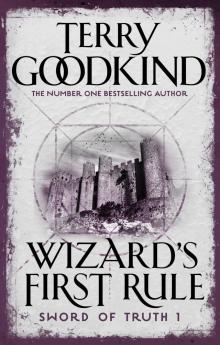 Wizard's First Rule
Wizard's First Rule Shroud of Eternity
Shroud of Eternity Debt of Bones
Debt of Bones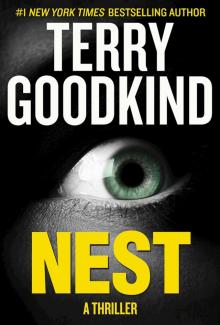 Nest
Nest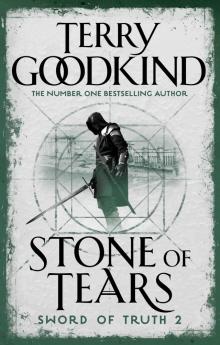 Stone of Tears
Stone of Tears The Omen Machine
The Omen Machine The First Confessor
The First Confessor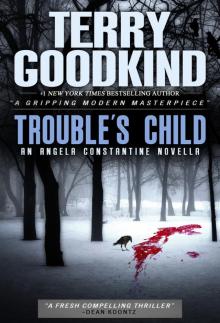 Trouble's Child
Trouble's Child Faith of the Fallen
Faith of the Fallen Chainfire
Chainfire Naked Empire
Naked Empire Temple of the Winds
Temple of the Winds Severed Souls
Severed Souls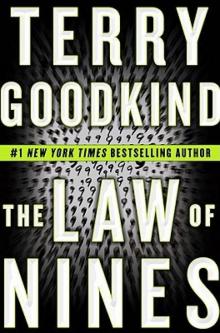 The Law of Nines
The Law of Nines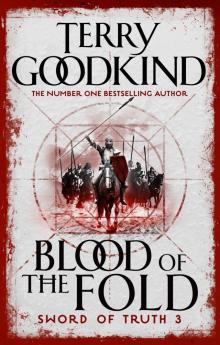 Blood of the Fold
Blood of the Fold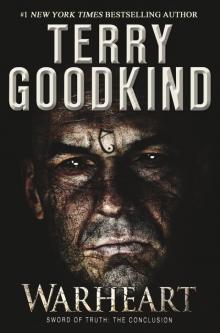 Warheart: Sword of Truth: The Conclusion
Warheart: Sword of Truth: The Conclusion The Sky People
The Sky People Heart of Black Ice (Sister of Darkness: The Nicci Chronicles Book 4)
Heart of Black Ice (Sister of Darkness: The Nicci Chronicles Book 4) Hateful Things
Hateful Things The Scribbly Man
The Scribbly Man The Pillars of Creation
The Pillars of Creation Soul of the Fire
Soul of the Fire Wasteland
Wasteland Heart of Black Ice
Heart of Black Ice Crazy Wanda
Crazy Wanda Death's Mistress
Death's Mistress Siege of Stone
Siege of Stone The Third Kingdom
The Third Kingdom Into Darkness
Into Darkness The Girl in the Moon
The Girl in the Moon Witch's Oath
Witch's Oath Temple of the Winds tsot-4
Temple of the Winds tsot-4 Naked Empire tsot-8
Naked Empire tsot-8 Wizard's First Rule tsot-1
Wizard's First Rule tsot-1 The First Confessor (The Legend of Magda Searus)
The First Confessor (The Legend of Magda Searus)![[Sword of Truth 9] - Chainfire Read online](http://i1.bookreadfree.com/i1/03/27/sword_of_truth_9_-_chainfire_preview.jpg) [Sword of Truth 9] - Chainfire
[Sword of Truth 9] - Chainfire Chainfire: Chainfire Trilogy Part 1 tsot-9
Chainfire: Chainfire Trilogy Part 1 tsot-9 Soul of the Fire tsot-5
Soul of the Fire tsot-5 Pillars of Creation
Pillars of Creation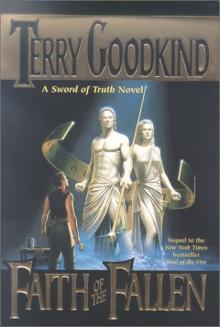 Faith of the Fallen tsot-6
Faith of the Fallen tsot-6 The Pillars of Creation tsot-7
The Pillars of Creation tsot-7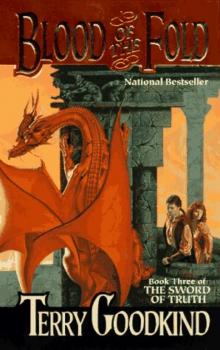 Blood of the Fold tsot-3
Blood of the Fold tsot-3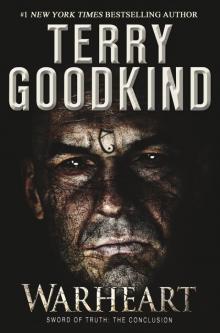 Warheart
Warheart Stone of Tears tsot-2
Stone of Tears tsot-2 Death's Mistress--Sister of Darkness
Death's Mistress--Sister of Darkness Phantom: Chainfire Trilogy Part 2 tsot-10
Phantom: Chainfire Trilogy Part 2 tsot-10 Confessor: Chainfire Trilogy Part 3 tsot-11
Confessor: Chainfire Trilogy Part 3 tsot-11